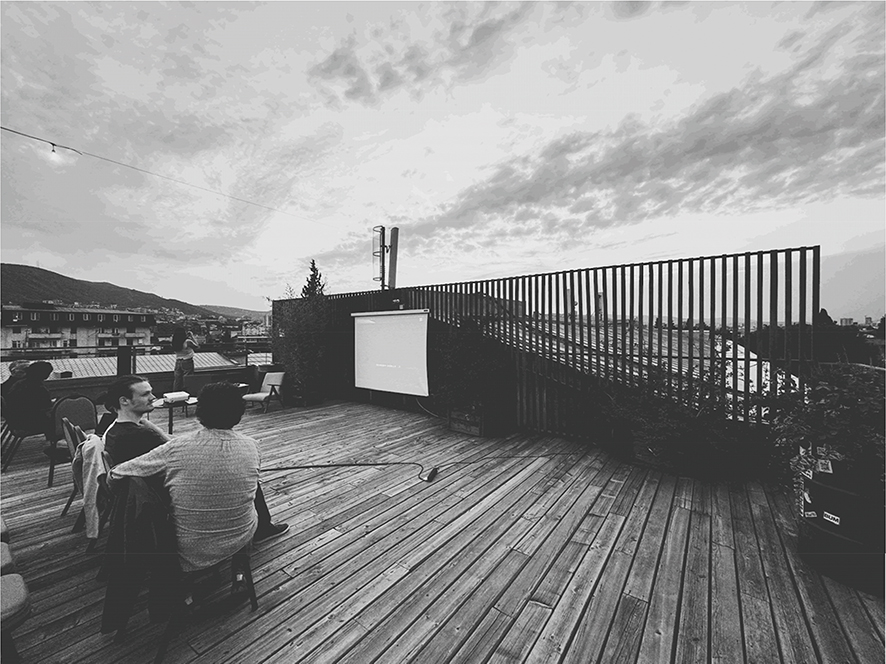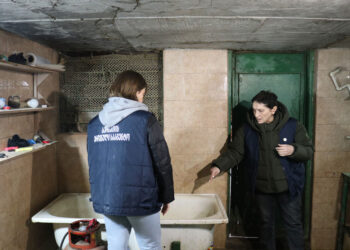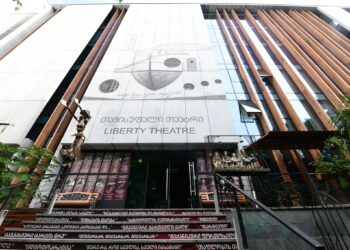Magic Mountain, directed by Mariam Chachia and Nik Voigt, stands as a poignant testament to the power of documentary cinema in illuminating the lives of society’s forgotten. This 73-minute film, a joint production between Georgia and Poland, transports viewers to Abastumani, a remote Georgian mansion where tuberculosis patients live in isolation. The film’s special screening, organized by KineDok at the picturesque Fabrika Rooftop, provided a unique backdrop that echoed the film’s themes of solitude and resilience. Additional screenings with English subtitles will be held at various locations around the city this weekend.
A Journey into Isolation
The narrative of Magic Mountain is driven by Mariam, who is haunted by a recurring nightmare of being trapped in Abastumani. Her quest to confront this fear leads her to the actual mansion, unveiling a microcosm of human existence marked by illness and societal neglect. The mansion, a relic of the past, serves as both a physical and symbolic space, where the patients’ isolation mirrors their social marginalization.
Chachia and Voigt’s direction is meticulous in portraying Abastumani not just as a setting, but as a character in itself. The mansion’s decaying infrastructure, overseen by Soviet-era doctors, speaks volumes about Georgia’s historical and cultural landscape. This backdrop serves to highlight the tension between the preservation of cultural identity and the inexorable march of modernity, epitomized by the buying and demolishing of the building by a Georgian oligarch.

Cinematic Realism and Magical Resistance
The film’s visual style is stark yet intimate, employing natural lighting to capture the rugged beauty of the mountainous landscape. This choice underscores the physical isolation of Abastumani, while also imbuing it with an ethereal quality. The directors’ documentary roots are evident in their observational approach, allowing the audience to witness the unvarnished reality of the patients’ lives.
A particularly striking aspect of Magic Mountain is its use of magical realism. The film suggests the presence of faded voices that accompany the oligarch’s demolition of Abastumani. The element of the supernatural serves as a metaphor for the indomitable spirit of the marginalized community. This metaphor echoes the themes of Thomas Mann’s novel The Magic Mountain, where the isolated sanatorium becomes a microcosm for exploring broader existential and societal issues.
Community amidst Adversity
Despite the bleakness of their circumstances, the residents of Abastumani form a tight-knit community. The film deftly captures their daily routines—from the morning queues for medicine to the afternoon social interactions and the night-time struggles with alcohol and cigarettes. This depiction of communal life amidst adversity highlights the resilience and solidarity of the human spirit. It’s a narrative that resonates deeply, offering a glimpse into how people find connection and support in the most challenging environments, especially in self-destruction.
Directorial Vision and Audience Engagement
Chachia and Voigt’s backgrounds in documentary filmmaking lend authenticity and depth to the narrative. Chachia’s personal story of stigmatization and Voigt’s experience as a documentary photographer enrich the film with cultural specificity and visual poignancy. Their collaborative vision results in a film that not only tells a compelling story, but also prompts reflection on broader themes of isolation, community, and resilience.
The screening at Fabrika Rooftop, with the directors in attendance, added a layer of engagement that enhanced the viewing experience. The picturesque setting, juxtaposed against the film’s themes of isolation, provided a contemplative space for the audience. The post-screening question-and-answer session allowed viewers to gain deeper insights into the filmmaking process and the directors’ motivations, fostering a greater appreciation of the film’s intricacies.
Magic Mountain is more than a documentary; it is a cultural exploration of marginalized lives and the spaces they inhabit. Through its evocative cinematography and poignant storytelling, the film offers a window into a world where the past and present collide, and where the human spirit resists in the face of change. The special screening event at Fabrika Rooftop, with Chachia and Voigt’s personal engagement, underscored the film’s impact and the importance of communal viewing experiences in appreciating cinematic works.
In an era where the boundaries between documentary and narrative cinema continue to blur, Magic Mountain stands out as a powerful example of how film can capture and convey the complexities of human existence. It invites us to reflect on the ways in which we relate to and support those who live on the margins, urging us to see beyond their isolation to the shared humanity that connects us all.
By Ivan Nechaev














